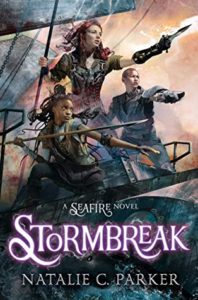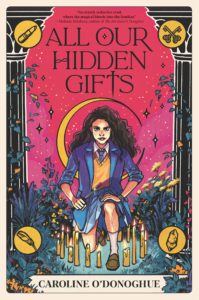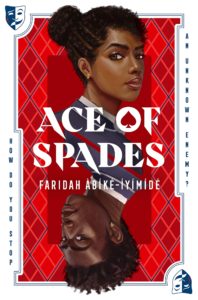After a fallow period of YA reading, I’ve been absolutely tearing through new YA books this October. Hot take, YA is really good right now! Sometimes when I think about my own youth and the, like, three bookshelves worth of YA books my library had back then, and half of them were Lurlene McDaniel, and that was a good library system, I just feel very very happy that the youth of today have such an amazing profusion of great books. At least something is going right for the youths! The rest of the world is chaos and disaster but they have this one thing!
Stormbreak is the third in a trilogy that began with Seafire, which was pitched as “Mad Max Fury Road but make it boats” (the latter half of which sounded great and the former half of which brought me out in hives because Mad Max Fury Road is the most stressful shit I have ever watched in my entire life). The series tells the story of a rogue ship of angry girls doing their level best to take down a warlord and his team of fighters. Over the course of the series, Caledonia Styx has become a true leader, with her best friend Pisces and her boyfriend Oran at her side. When Stormbreak opens, they have retreated to plan how best to complete their war against the Bullet fleet. When their stronghold is attacked unexpectedly, Caledonia must decide how to chase her dream of a better world, at the risk of losing herself in the process.
Is it me, or are we moving away from YA trilogies as a culture? I feel like I have been reading lots of standalones and duologies lately, but maybe that’s just me. Regardless, I was delighted to finally reach the conclusion of the Seafire series, which has been so consistently fun, thoughtful, and exciting. Because this is the final book in the series, Caledonia’s victory over Lir and his Bullets is something of a foregone conclusion, though Parker does terrific work in keeping the good guys on their toes.
Where the book excels is in creating moral suspense. Caledonia is navigating the ethical risks and demands of leadership in a time of war, while keeping in mind the eventual, hoped-for transition from war to peace. Much though she wants to stay true to her highest ideals, the world teaches her again and again the necessity of moral compromise. Stormbreak is as ripping an adventure tale as its predecessors, but it’s also an examination, not in a boring way, of how to choose among an array of bad options to attain your goals without losing your deepest self. It’s a marvelous conclusion to a superb YA series.
Having liked, not loved, Descendant of the Crane (it was sold to me as The Twistiest Book of Them All, and I didn’t find it to be that twisty but probably that’s just because the reviews led me to expect, like, Fingersmith), I wasn’t sure what to expect from Joan He’s sophomore YA novel. Taking place in two different timelines, The Ones We’re Meant to Find follows a science genius named Kasey trying to come to terms with her sister Celia’s disappearance; and a girl named Cee who lives alone on an island and wants nothing more than to build a boat and get back to her sister Kay.
I… wow. Really, really wow to The Ones We’re Meant to Find. It blew me away. It’s a little slow to start, especially if you think you already know what’s going on with Kacey and with Cee, and more broadly with the world. But Joan He is doing something a lot more interesting than first impressions might suggest. Kacey–socially awkward, brilliant, isolated, either persistent or in deep denial–wants nothing more than to make sense of the loss of her sister, as her search for the truth brings her closer to an understanding of the bitter, broken world she lives in. Cee has spent three years trying to get back to her sister when a new person washes ashore, a kind and handsome boy who periodically loses touch with reality and tries to kill her. Their shared yearning for a lost sister kept me reading even when I feared that the book would follow a slightly by-the-numbers plot.
Ha bloody ha ha, joke’s on me! This is one of those books where reading the end availed me nothing, because the end is predicated on a midway-through reveal that casts everything before and after in a brand new light. To say I loved it would be an understatement, and it’s hard to talk about the back half of the book without giving away what’s going on. What I will say is that while the book is very fundamentally about sisters, it’s about so much more than that too. Corporate corruption, disaster planning, climate change, the merits of survival and happiness, idealism vs cynicism, ethical science — I could go on! Heartbreaking though much of the story is, it ends so beautifully that I was near tears.
Be warned that if you don’t love an ambiguous ending (I looooooove an open ending), The Ones We’re Meant to Find might not be for you. But I hope you will read it. I loved it.
All Our Hidden Gifts is about a girl called Maeve who finds an abandoned deck of Tarot cards and starts telling fortunes for her classmates. It’s all fun and games until she does a reading for her ex-best friend Lily, and a card appears — the Housekeeper — that isn’t a part of the regular deck. The next thing anyone knows, Lily has disappeared. It’s up to Maeve, Lily’s brother Roe, and Maeve’s new friend Fiona to try and figure out what’s happened to Lily and whether they have any hope of getting her back.
The good: Are Irish feminists as prone to TERF-iness as British ones? I do not know, but I do know that it was a surprise and a joy to find an Irish book that’s so warm about gender. Though Roe doesn’t offer a label for himself, he’s at least exploring his options where gender is concerned, and neither the book nor Maeve treats this as a problem. (Which it isn’t! And shouldn’t be! But you know how TERFs do.) I also love that the central emotional conflict is a fractured friendship. Maeve’s romance with Roe is certainly a going concern, but it’s her friendships that take center stage. She has been a bad friend to Lily, long before the fateful Tarot reading, and the book neither excuses her cruelty nor treats her as irredeemable.
The bad: Honestly not enough searching for the missing person! The plot felt a little disorganized, jumping between Lily’s disappearance and the emergence of an anti-queer movement that threatens Maeve’s friends and town. Those conflicts turn out to be related, but it felt like neither of them was able to get the full airing they deserved. I also regret to report that I am a pedantic twat when it comes to books about Tarot cards. We’re meant to believe that Maeve has natural talent with the Tarot cards, but her readings felt very rote and basic to me. Tarot cards are not a real thing and fortune-telling is pretend, and it’s reductive and boring to interpret the Five of Cups as “sadness.” (said Jenny, like an absolute asshole)
That said, I’d read another book in this series! Maeve is kind of the weakest link, which is common in YA novels and sitcoms, but I’d be delighted to read more about Roe and Fiona, and I’d love to get to know Lily better and witness her (I hope!) eventual reconciliation with Maeve. Love a book that creates tension in relationships other than just romantic ones!
I bought Ace of Spades for a friend earlier this year on the strength of its gorgeous cover and delightful interior design, and then I got jealous that I had given it away and couldn’t read it myself, so I checked it out of the library a few weeks ago. (You know, the obvious solution to the problem I want to read a book I don’t own.) I’m so glad I did! Ace of Spades follows Chiamaka and Devon, the only two Black students at the exclusive Niveus Private Academy. Both seniors, both Prefects, they are working hard to get ready for college and the bright futures the school has promised them when an anonymous figure called Aces starts sharing their darkest secrets with everyone in the school. Though Chiamaka and Devon have always run in different circles, they must team up to find answers before their futures are ruined completely.
As I have perhaps mentioned in this space before, I’m wild about books where people have done a sin and are waiting to see if they’re going to be found out. Chiamaka and Devon have done… a lot of things. I did not do as many things in high school as all the characters in this book, omg! I was such a boring, straight-ahead high schooler. Never had a drink. Did not bounce through relationships. Never killed a person. (That’s what sets me apart from Laura Bush. This has been: a cheap shot.) Ace of Spades keeps up the suspense of what secrets are going to be uncovered and how much damage those secrets will wreak in Chiamaka and Devon’s lives. At the same time, the reader gradually comes to realize that there may be more malicious forces at play here than it first seemed.
Perhaps it is not much of a spoiler — based on what you already know from the title and the premise — to admit that racism is very much at play in what’s happening to Chiamaka and Devon. Ace of Spades is sociological horror as much as it’s anything else, and there are several reveals that make the Psycho theme music start playing in your head, in the best way. The terror of realizing that you’re alone in a room full of people hostile to you — or a school full — is palpably realized here, and I was unironically whispering “get out” to my book at several points. The climax features a rescue that’s maybe a tiny bit convenient, but it’s so thematically appropriate that I chose not to care. I can’t wait to see what this author does next.
And that’s it for my recent YA reading! Based on this, what should I read next?



